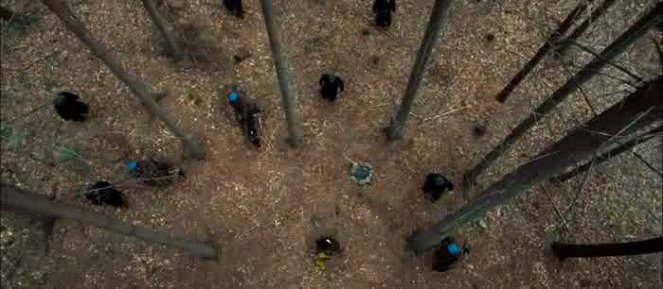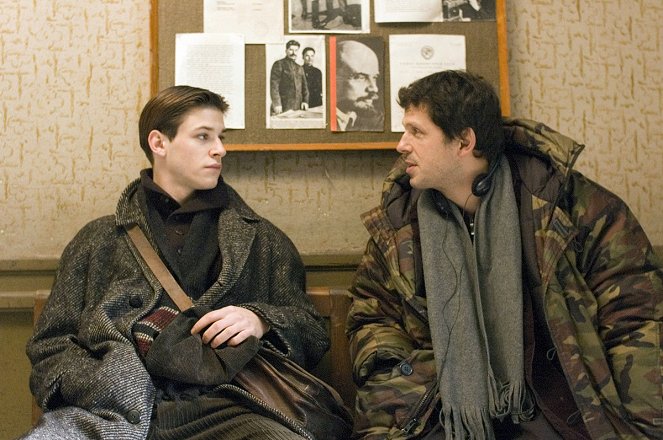Reżyseria:
Peter WebberScenariusz:
Thomas HarrisZdjęcia:
Ben DavisMuzyka:
Ilan EshkeriObsada:
Gaspard Ulliel, Li Gong, Dominic West, Rhys Ifans, Kevin McKidd, Brian Caspe, Marek Vašut, Pavel Bezděk, Václav Chalupa, Petra Lustigová, Jan Nemejovský (więcej)Opisy(1)
Jak wyglądała młodość najsłynniejszego seryjnego mordercy-kanibala w historii. Co wzbudziło w nim nieludzką ciekawość zbrodni? Czy młody Hannibal budził się w ciemnościach słysząc ryk zarzynanych owiec? Hannibal. Po drugiej stronie maski, oparty na powieści Thomasa Harrisa pod tym samym tytułem, to historia narodzin potwora. Młody Hannibal (Gaspard Ulliel) podczas II wojny światowej w szokujących okolicznościach traci rodziców oraz siostrę. Ucieka z rodzinnej Litwy zajętej przez komunistów i dociera do Francji. Na miejscu spotyka niezwykłą Lady Murasaki (Gong Li), która wprowadza go do świata nienagannych manier, wyrafinowanej sztuki i nie tylko? Rozsmakowany w muzyce klasycznej i książkach, młody Hannibal niespodziewanie poczuje smak zepsutego dzieciństwa, smak siostry... (SPI)
(więcej)Materiały wideo (4)
Recenzje (9)
My God, what have I done to deserve this? Hannibal with a samurai sword, an woman with a Hiroshima complex, lots of nonsense and a host of lousy actors. Next time they might take it from the other end, I suggest "Hannibal Rises Again: Revenge From The Grave." Thomas Harris, I know money is a nice thing, but you're a clown.
()
This film squeezes money out of an infamous brand, done in the monstrously unfair manner of a cheap TV adaptation, and lacking elegance and distinction. Instead, it shows Hannibal as a traumatized child who has been bewitched by a samurai in France and would like to take it out on his aunt. Thomas Harris on drugs, Marek Vašut with a knife in his throat, and we can announce R.I.P to Gaspard Ulliel, whose psychopathic look in his eyes suited him so well, knowing full well that he was closing his way out, even though he is an excellent actor.
()
Great disappointment, the weakest Hannibal hands down. The plot is very unoriginal and boring, the murders aren’t interesting and there are lots of unnecessary scenes and holes in logic. Gaspard Ulliel looks silly rather than demonic and in two of the murders he almost made me burst out in laughter, which doesn’t happen often and, more importantly, shouldn’t happen. 50%
()
When The Silence of the Lambs appeared in movie theaters, it wasn't the first film about a doctor with peculiar tastes and unpredictable behavior, but it immediately meant huge success for the audience and even for critics, because it was filmed with extraordinary elegance, a clever script, and skillful direction. These elements were able to elevate this typically B-movie theme with problematic ethical implications to an acclaimed classic of its genre. None of the films that followed The Silence of the Lambs succeeded for various reasons, but Hannibal Rising is the weakest of all those attempts. This film is one big disaster because it relies on a terrible script and obviously has an inadequate budget considering the ambitions it had. The screenwriter didn't address many things, so the film comes across as illogical and even ridiculous to anyone who doesn't settle for bloody action. Just a small example: Hannibal easily crosses the border of the Soviet Union during the height of the Cold War, freely travels through Soviet territory, and in the Baltics where a bloody civil war was raging and the NKVD was conducting mass ethnic cleansing to suppress the national liberation movement. It's about as likely as if I paraded through the sacred mosques of Mecca and Medina with a cross on my neck wearing muddy boots. The villains only have loosely outlined character traits and they are only interesting as food for a budding cannibal. The film relies on too many coincidences and many motifs come across as kitschy (for example, a beautiful Japanese aunt is expected to greet young Lecter in France, of course with a collection of samurai swords). The gang of villains, of course, relocates to France after the war so Lecter won't have far to go during his vengeful campaign... The opening part of the film feels deaf, because the worst massacres were happening in the Baltic states and Belarus during World War II, and the film barely draws from those wartime horrors. Cannibalism was actually relatively common - just think of what took place in besieged Leningrad or in concentration camps. Massacres of civilians and especially Jews were apocalyptic; history enthusiasts know how the population of Lviv was reduced within 48 hours after the Soviet army withdrew from the city. The screenwriter and director weren't able to utilize any of this and the motive of young Lecter's revenge compared to what hundreds of thousands of children were experiencing in Eastern Europe is unconvincing as an explanation for his psychopathic actions and fails as a justification in the style of a small criminal punishing a bigger one. Where The Silence of the Lambs played with the audience and created tension, Peter Webber's film is too concrete, so there are only a few brutal murders that are meant to carry the entire film... Overall impression: 40%.
()
Somehow I didn't understand what Hannibal was born for. To be essentially a positive character destroyed by vengeance? To be an impressive portrait of a soul destroyed by war? Or to become, at least for a moment, a basically sympathetic hero-avenger? Even after 117 minutes of Webber's film, I didn't understand much more than that. The strange mess with a nickel-and-dime psychology alternates moments of apparent realism with B-movie motifs, it is unable to be either original or impressive - it's just perfectly nothing, confused, without gradation, flair... or anything memorable. Perhaps only Gaspard Ulliel had crazy charm and inner cohesion. Unfortunately, this cannot be said about the film as a whole.
()



Reklama